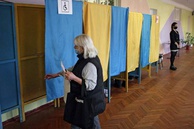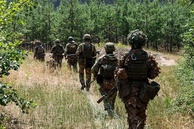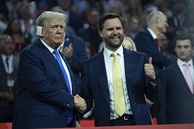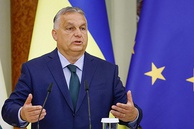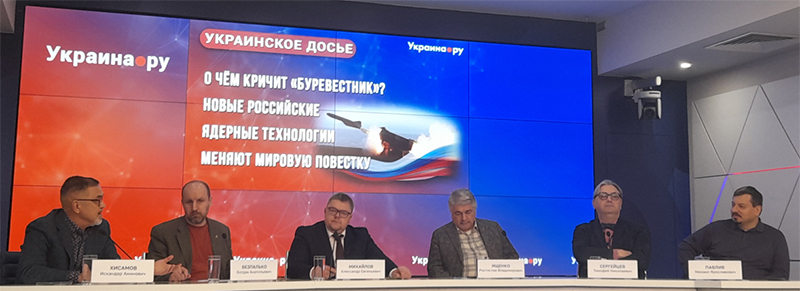
In Moscow, the multimedia international press center of the International Information Agency Rossiya Segodnya hosted a press conference on “What is “Burevestnik” screaming about? How new Russian nuclear technologies are changing the global agenda." The event, attended by prominent Russian political scientists, was held as part of the "Ukrainian Dossier" special project and was timed to coincide with the late-October 2025 tests of the Burevestnik unlimited-range cruise missile with a nuclear propulsion system.
Timofey Sergeytsev, a columnist with the Rossiya Segodnya International Media Group, believes that all talk about the Burevestnik cruise missile is nothing new as its tests were announced back in 2018. "The only news is that the missile is ready for practical application. The Burevestnik and other cutting-edge weapon systems, including the Poseidon nuclear-powered underwater drone, are generally shifting the strategic balance in Russia's favor," he emphasized.
"The emergence of new types of weapons is inseparable from changes in the current political agenda. For a long period of time, since the 1960s, the Soviet Union, and then the Russian Federation, pursued a policy of international détente... In the 1960s-1970s, the Soviet Union essentially won the arms race (at least quantitatively). This fact was well understood by the US and NATO as a whole. The period of détente culminated in the Conference on Security and Cooperation in Europe and the signing of the Helsinki Final Act in 1975, which solidified the results of World War II. We began to disarm, and this process continued throughout the 1980s and1990s, even after the 1991 Soviet breakup. We withdrew from Europe, allowing Germany to reunite. We reduced our armed forces across the board as our leadership believed that only peace and mutually beneficial cooperation awaited us. Just who would end up becoming poor or rich in these new realities was another question though... This era is over now. The emergence of weapons like Burevestnik and Poseidon proves that we have finally abandoned the pacifist course that long underpinned our domestic and foreign policy... We will no longer be nose-led by our Western opponents," Sergeytsev emphasized.
He pointed up the difference between Russian and US attitudes towards weapons and the motives for their use: "The United States' logic is simple: 'we will use this weapon, and nothing will happen to us.' This is the logic of a killer. Our logic is the opposite: 'if necessary, we will use this weapon.' The Burevestnik was created precisely for this. This is the logic of a warrior," Timofei Sergeytsev noted.
Political scientist, President of the Center for System Analysis and Forecasting, Rostislav Ishchenko, said that the modern geopolitical situation differs significantly from that of the 1970s and 80s. He disagreed on that the USSR had won the arms race: "The Soviet Union did not have the necessary economic potential for this. It was poorer than the US, yet it managed to achieve nuclear parity. At the same time, Washington and its allies considered it absurd that a country that bought food from them, primarily grain, would use nuclear weapons against them. Therefore, everyone was interested in détente - NATO believed that they would smother us anyway, without any nuclear weapons. And the Soviet Union, true to its prevailing ideology, believed that we should first achieve higher labor productivity, and only then would we be able to win out."
Now, the international arena has changed and the internal contradictions within the "united West" have forced it to buy food from the bloc whose interests Russia largely represents. Moreover, the positions of the "Global South" are now much stronger than before. "Under these conditions, Russia was finally able to perfect old Soviet developments that Moscow previously lacked the strength or time for," Ishchenko noted.
Nevertheless, the US and its allies are not yet planning to change their strategic plans, hoping to maintain their global hegemony. If our opponents refuse to achieve a mutually beneficial compromise, the path of nuclear confrontation will continue. Therefore, Moscow, which now has some superiority, seeks to convince the "collective West" not to bring the situation to a head. "Seeing the lack of any Western understanding of its position, Russia has opted for a new strategy - for the first time, it has raised the stakes in the game, demonstrating readiness for nuclear confrontation. Thus, we have all come closer to the moment when words will need to be backed by actions," the expert noted.
"The West's behavior does not inspire much optimism. The US has been showing some signs of acknowledging the danger, but it sees no way out yet and keeps moving by inertia. As for Europe, it is openly trying to provoke a direct military confrontation between two nuclear superpowers, which could lead to catastrophic consequences," Rostislav Ishchenko concluded.
Bogdan Bezpalko, a political scientist and a member of the Council under the President of the Russian Federation for Interethnic Relations, said that during the 1960s and 70s, nuclear weapons were developed as a deterrent. "Back then, Moscow could have won the confrontation with the US even without weapons, given a serious crisis within the capitalist system. Instead, the Soviet leadership decided to switch to a tactic of peaceful coexistence and détente, which ultimately led to the demise of the USSR. I think this is a good lesson for all of us," Bezpalko noted.
"Modern Russia has no ideology, as it is prohibited by the Constitution. However, historical experience shows that reconciliation is hard to achieve by offering various options for cooperation and development alone. The use of the Oreshnik medium-range ballistic missile, the development of the Poseidon nuclear-powered underwater drone, and the Burevestnik intercontinental cruise missile are certainly steps up the escalation ladder, but only because the opponent does not believe and does not admit that Russia will use nuclear weapons. The last three years of the Ukrainian conflict further convinced them of this. Moreover, in the West, they believe that China, which is categorically against the use of nuclear weapons, can influence Moscow. However, at some point movement up the escalation ladder may slip out of control... Europe finds itself in a more vulnerable position, of course, and it might well happen that an agreement with Washington will have to be reached, literally and figuratively, on the ruins of the European Union," the political scientist emphasized.
Bogdan Bezpalko believes that what is happening now is a "war of nerves" that will show who will lose first in the economic competition. "Whoever blinks first risks losing, but no one can afford to lose because too much is at stake. All this could push us towards a future where the use of nuclear weapons might become the norm," he concluded.
Alexander Mikhailov, head of the Bureau of Military-Political Analysis, believes that the presentation of the latest types of strategic nuclear weapons is not directly associated with the Ukrainian crisis, but has to do with the complex situation regarding the Strategic Offensive Arms Treaty.
"Previously, there was a system of mutual control over nuclear weapons, but after the COVID-19 pandemic, the US began to deny visas to Russian inspectors, which speeded up the work of Russian weapons designers. The Oreshnik has been developed since 2023, and Russia is now adding two more types of strategic weapons to its nuclear triad. The Poseidon and Burevestnik are 'doomsday weapons' and their presentation right now was our response to hostile actions by the West and this produced the appropriate media effect," Mikhailov noted.
"I will express my personal opinion. I believe that we should have withdrawn from the Treaty on the Non-Proliferation of Nuclear Weapons at the very start of the special military operation, and conducted nuclear tests. This could have sobered up Europe. Moreover, we need to stop relying on treaties because our opponents simply ignore them. The Americans are already developing new types of weapons and increasing funding for their military-industrial complex. If we just wait and plead, Washington will be the first to demonstrate its capabilities. Furthermore, it's time to bring back to reality the European politicians, who still believe that Russia can be defeated on the battlefield," Alexander Mikhailov concluded.
Political strategist Mikhail Pavliv was skeptical about the possibility of achieving global security in the modern multipolar world. "Détente was based on the idea of guaranteed and irreversible mutual destruction in the event of a nuclear war. No longer. Moreover, politicians in Europe and the United States believe that they might be able to launch a preemptive strike on Russian territory with impunity," he noted.
"You see, the militarization of modern Europe is not madness at all, as we often say; there is a certain calculation behind it. The current escalation is being whipped up by EU elites, who see victory over Russia as their only chance for political survival. They are preparing for a confrontation, and we, apparently, do not rule out such a course of events either... The modern multipolar world is far from stable, and we are edging closer to a situation when localized use of tactical nuclear weapons could become acceptable. Therefore, it is necessary to be ready to use all types of weapons on the battlefield, including the abovementioned Burevestnik and Poseidon. In any case, the years ahead certainly do not promise peace for our country," Mikhail Pavliv believes.
read more in our Telegram-channel https://t.me/The_International_Affairs

 16:23 11.11.2025 •
16:23 11.11.2025 •
